What Is CDN? How It Works?
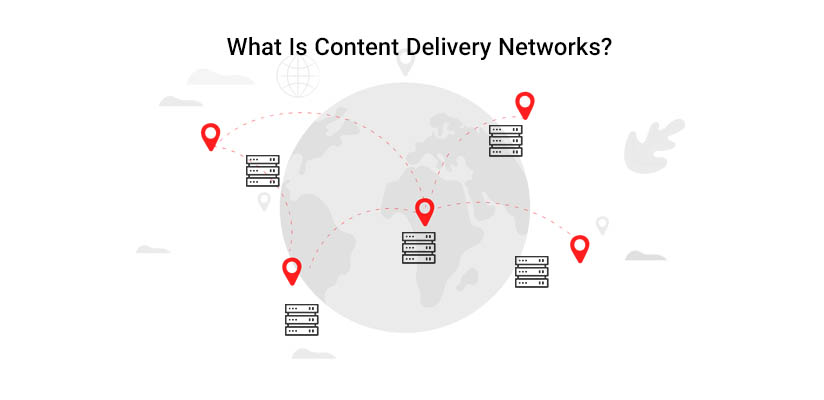
What is CDN? The content delivery network (CDN) refers to a set of servers distributed geographically that can speed up the transfer of internet content in a way that brings it close to the location where users are. Data centers all over the world utilize caching, a technique that stores temporary copies of files in order to let you access internet content using any device that is web-connected or a browser faster via a nearby server. CDNs can cache images, web pages, and videos in proxy servers close to your location. This lets you enjoy things like watching movies, downloading software and checking your balance in your bank or posting on social networks, or even making purchases without waiting for the content to load.
You can consider the content delivery network (CDN) as an ATM. With the presence of a cash machine at nearly every corner, it is quick and effective to access cash. There’s never a wait in lengthy bank lines and ATMs are situated at a variety of locations that allow quick access.
Content delivery network services were developed to alleviate network congestion that is caused by the transmission of rich web content including video and graphics via web pages – just similar to traffic jams. The process of transferring content from centrally hosted servers to users on their own was not feasible. CDNs have expanded to contain everything from text, images, scripts, and media files, to software downloads portals, documents, online shopping streaming media, on-demand streaming media as well as social media sites.
In this article, we would like to talk about content delivery network services, who use CDN, the benefits of CDN, and introduce some of the best CDN providers in 2022.
What Is a CDN Function?
The purpose of a content delivery network is to decrease the amount of latency. It is the annoying delay that you encounter when you attempt to connect to a webpage or video stream prior to it loading fully onto your computer. Though it is measured in milliseconds it could feel like a long time or even cause an error in loading or a time-out. Certain content delivery networks reduce the delay by reducing the physical distance that content must travel to get to you. Thus, bigger and better-distributed CDNs can deliver web content faster and effectively by placing the content as close to the end-user as they can.
Let’s say you’re on the weekend and you’d like to relax and watch the most recent Hollywood film — the CDN locates the best server on their network to deliver that video. Most likely, it’s the closest server to your location. The media files are stored in a cache and will be available on the server of the content delivery network for any other requests by users within the same geographic region. If the content you want is no longer available or is outdated the CDN service will save the latest content to be available for any subsequent requests.
Although the distribution of web content is an incredibly common usage for CDNs it’s not their sole purpose. In reality, CDNs provide many different types of content including 4K and HD-quality video audio streams and software downloads, such as games, apps, OS upgrades, and more. Any data that is able to be digitally converted can be delivered via a content delivery system.
What Is CDN in Web Hosting?
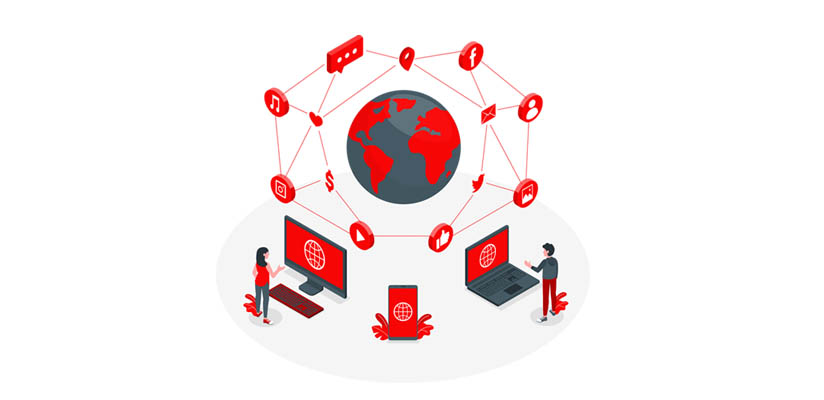
While CDNs aren’t web hosts and do not deliver content via the last mile to the consumer CDN servers are distributed geographically to store content near the users and their ISPs no matter where they are located in the world. This storage of content on the edge of networks helps to decrease delay and also deliver identical contents to numerous users, allowing for better access.
Network operators, also called cell phone network providers and wireless services which are struggling to keep pace with the constant demand for online videos using a CDN hosting platform could be an extremely efficient and cost-effective solution to keep up with the competition. Content delivery networks will help operators provide a rapid, secure, and high-quality online experience, with the high-quality that users want on every device that is web-connected.
Who Uses CDN?
Over the past 20 years, CDNs have been the unnoticed backbone of the internet, delivering online content for banking, shopping, healthcare, and many other companies rapidly and efficiently.
Without CDNs and their capacity to store and replicate information from the servers of origin and deliver digital content closer to the point where users can connect to the web could slow to the point of a crawl.
You might not be aware of it however if you’ve ever done virtually everything online you’re likely to have a CDN that can provide you with a speedy and reliable experience. Here’s an easy illustration to show how these networks handle traffic behind the scenes to ensure that happens:
A CDN can balance traffic in order to give all users who access internet content the best experience. Imagine it as the actual routing of traffic in the world. There could be a particular way that’s typically the fastest from point A to B if there aren’t any other vehicles following it, but when it gets overcrowded, it’s best for everyone if traffic is dispersed over several different routes. This could mean that you’ve taken on a route that is a couple of minutes longer (or microseconds, if you scale it to the speed of the internet) however you won’t be trapped in the traffic blockage that’s currently forming along the route that’s usually the fastest. This could mean that you are taken on the fastest normal route, but not stuck in traffic because other vehicles are taken on longer routes. Therefore, it’s not just about slowing down the speed of your car, but rather load-balancing and fully utilizing all available resources.
If you need to have a custom WordPress website design or designing a website with any CMS’s, do not worry about your CDN platform. You can use CDN for any kinds of websites.
In reality, without CDNs, we’d be caught in traffic jams more often while surfing the internet.
Who are the CDN users?
Nearly everyone who uses the internet utilizes the CDN. They were developed to provide the fastest and most reliable experience for users accessing the internet. They are utilized by developers of applications and content as well as network service providers who provide these benefits to their customers.
CDNs to End-User
Web applications and websites that are hosted by the CDN have faster page load times as well as faster transactions and a more consistent online experience. But, users may not be aware that they are connected to an online content delivery network, even though they take advantage of its benefits because the technology is working in the background. They receive the content they asked for from their mobile or ISP.
CDNs for Content owners
Owners of applications and content such as e-commerce websites, media properties, media sites, and cloud computing firms — make use of CDNs to enhance the customer experience as well as lower abandonment rates, increase the number of ads that are displayed, boost conversion rates, and increase the loyalty of customers. A CDN also helps enhance security on websites in particular in helping deal with and prevent the impact of a distributed denial of service (DDoS) threat.
CDNs to network service providers
With the rapid growth of streaming online and other rich media services, and increasing expectations from users regarding the performance of websites across a variety of devices today, many networks service companies are discovering it necessary to establish themselves as their own networks for the distribution of content. Network operators who deploy the use of a content delivery network could lower the rate of churning subscribers, aid in the development of value-added products and reduce the amount of traffic that is accessed by the network’s core and allow operators to offer CDN services to businesses and third-party owners of the content.
One of the benefits of CDN is that it is off-loaded. In response to a request for content on the web with the cached version within closer physical and close proximity to the user instead of coming from the server from which the content originated The CDN takes traffic off content servers and improves the web user’s experience. The result is that content can remain within the network of the operator and lessen the need for peers with various networks or traversing the internet in general to provide information.
What Are the Advantages of CDNs?
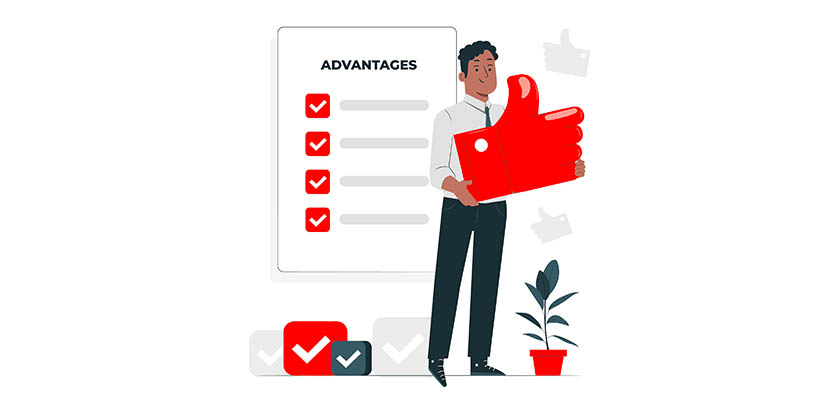
CDNs are the primary source of worldwide internet traffic. They assist in overcoming the most difficult problems of delivering content on the internet. Companies ranging from small and medium content providers to big corporations use the content delivery networks to offer seamless online experiences to their clients.
Because the internet wasn’t initially designed to meet the massive volumes of data, live HD videos, Flash Sales, and massive Downloads, CDNs were developed to help make the internet better. They allow secure delivery of media on a large scale and facilitate all these connected activities that have become a regular part of everyday life for the majority of us today.
Performance
Performance is the distinction between a single click that gives you instant access to the latest content and a click that is followed by a seven-second delay for a page to load or the video buffers. buffering is the wait time which is symbolized by a swirling circle on the screen, which occurs in the event that your internet service used by an ISP isn’t able to deliver data fast enough.
What is the process? When content requested is stored (pre-saved) by CDN’s servers. An end-user’s ISP (or mobile carrier) receives the content by connecting to an account that is part of the CDN’s network instead of waiting for the request to be sent directly to the server that originated it. A server from which the content you want to access is stored might be located far from your location. If that’s the case it is, using a CDN can bring the content closer to you, thereby improving performance and speed.
Let’s say for instance you are waiting for Fashion House X (FHX) located in Milan, Italy, to release its latest collection for online purchases. Fashion-conscious shoppers from New York, Paris, Rio De Janeiro, and Tokyo all use the internet to place their purchases. If FHX doesn’t use a cloud-based content management system that handles requests from every end-user has to go all up to Milan and then back. But, if FHX employs CDN and has loaded its content onto the CDN users can access the latest content via servers located in their city, which saves their data thousands or hundreds of miles over the course of a round-trip.
If the content hasn’t been saved when it’s not already saved, the CDN utilizes its programming experience of the connections needed to solve any problems. Advanced CDNs employ additional technologies to help to solve any issues with the delivery of uncacheable, or dynamic content as well as to identify the right type of content that can be delivered to various devices.
This means that when you use CDNs, content providers are able to offer fast, reliable web experiences to all of their customers no matter the location, browser device, network, or location they’re connecting to. Pages on the web load faster while buffering video time is decreased, and users are more active.
The Availability
Accessibility means that content is accessible to the end-user when there is a high volume of users when a lot of people are accessing content simultaneously or when there is a problem with the server in certain areas online.
If traffic volumes reach millions of requests per second even the strongest servers are tested. Without an infrastructure for delivering content, all the traffic needs to be handled by the infrastructure of a content provider. This could result in issues and poor user experience. The highly distributed server infrastructure that is offered through CDNs was designed by them to ease these problems. Advanced CDNs are, thanks to their extremely distributed design and large server platforms, can handle hundreds of Tbsp. of traffic and allow content providers to be available to even more users.
For a good example Let’s go back to FHX for a moment in Milan. The brand is loved by a large number of fashion-lovers and the new line is a source of excitement. When it launches the fashionistas from all over the world will go online to the FHX site simultaneously. If FHX does not have a CDN then all users would be able to access its primary server simultaneously which could cause it to crash. If, however, FHX uses the CDN the entire traffic will be handled by the CDN’s tens of thousands of servers, which will prevent FHX’s primary from failing and providing an excellent experience for all fashion-conscious people across the globe.
Security
As the amount of valuable data and transactions over the internet continue to increase and so do the powers of cybercriminals looking to exploit it. Malicious actors’ attacks could cost companies a lot of money. Alongside crimes committed by malicious insiders, DDoS and attacks on websites have been proven to be the most expensive.
Web-based attacks and denial-of-service attacks (SQL injection cross-site scripting, cross-site scripting, as well as a local or remote file inclusion attack) have become increasingly prevalent. They are often launched together with a DDoS attack in order to divert the attention of users while doing more severe damage through other vulnerabilities. In both attacks, it’s difficult to differentiate between legitimate and malicious traffic attacks that are constantly evolving with time, and require significant dedicated security resources to remain current in mitigation tactics.
Due to the growing volatility of the cyber-security landscape, security of websites is an essential CDN requirement. The latest and most sophisticated CDNs have made security their primary focus and offer innovative cloud-based services. CDNs must protect content providers and their users from various threats without the presence of malicious entities ever jeopardizing the delivery or availability.
Intelligence
Since they are the carriers of more than half the world’s internet communication, CDN providers generate vast quantities of information about users’ connectivity as well as device types and the browsing experience of users all over the world. They can make use of this data to assist their customers by offering them crucial actionable insights and insight into their customer base. This could include real-time monitoring, media analytics and monitoring to determine the level of engagement between users and websites, and cloud security intelligence that keeps the track of threats to online sites.
Best CDN Providers for 2022
1. Cloudflare CDN
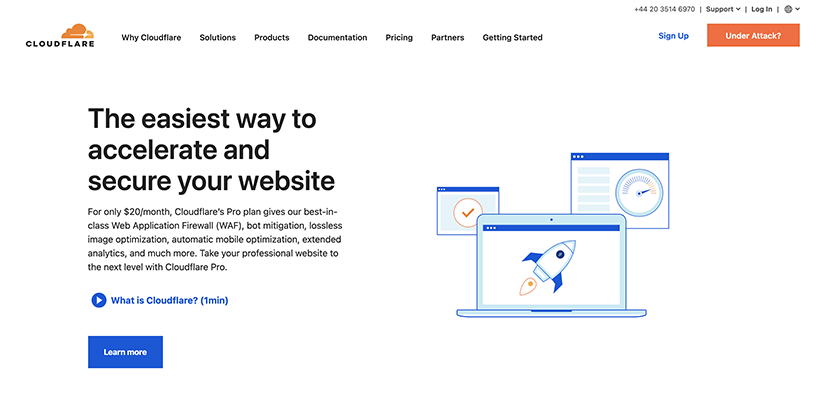
Cloudflare CDN is a hugely appreciated American streaming platform that combines user-friendly simplicity with features and capabilities that are professional grade.
The process of setting up is simple and there’s no need to alter your code. Simply change your DNS nameservers to use Cloudflare. Cloudflare will begin automatically, creating content into an archive for distribution to users in the closest region.
But there’s plenty to talk about. Web filtering can block bots, cut down on the amount of content that is spammed and safeguard your information from hackers, and also decrease DDoS attacks. Intelligent image optimizations can cut down image size by up to 30%, further increasing speed. It can support a broad range of standards like IPv6 and HTTP/2 as well as SPDY and smart page rules that allow users to manage traffic and a REST API that allows developers to be in complete control of the way in which the service operates. In addition, Flan Scan, a lighter vulnerability scanner for networks is added in addition.
2. Fastly CDN
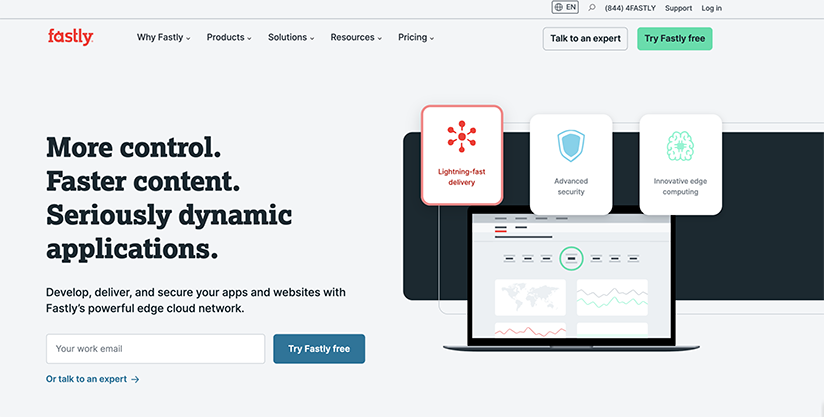
Fastly provides CDN strategies for a number of major companies, such as Spotify along Reddit. Fastly does exactly what it claims on the tin, delivering extremely speedy speeds. Based on the general guidelines of the CDNPerf’s rankings, it’s the second-fastest CDN that is available across the UK.
One of the benefits of Fastly is how flexible the service is. It has, for instance, different support for different types of video caching as well as having a number of controls available on a basic level for those wanting to understand the process of changing HTTP headers to alter the way that content is distributed. To simplify things, you can sign to multiple Fastly customer accounts with a single set of credentials.
3. KeyCDN
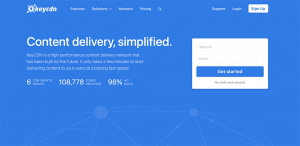
KeyCDN is a low-cost and user-friendly CDN that is the ideal choice for first-time users.
The process to get started is simple. Join with your email address, and you’ll be given 25GB of space to play with and no payment information is required. A well-designed dashboard will help in creating your first zone in just a few clicks. Additionally, some guides will assist you in connecting the service with WordPress and other programs.
Those who are more experienced will appreciate features like Origin Shield – this allows users to choose the KeyCDN server as the point of updating instead of the source, which can reduce the burden of your servers. You can modify headers and caches, or remove cookies, or even create your robots.txt. If the service is live and operational There are a variety of tools to report that allow you to monitor CDN performance in real-time. Additional features are available as well, such as Block Referrer that blacklists domains that are hotlinking content, as well as Image Processing that is excellent to optimize images.

